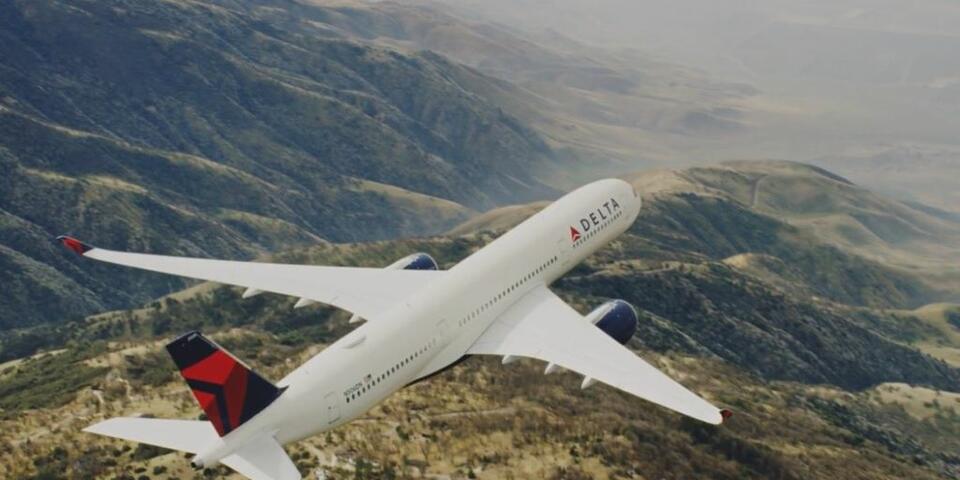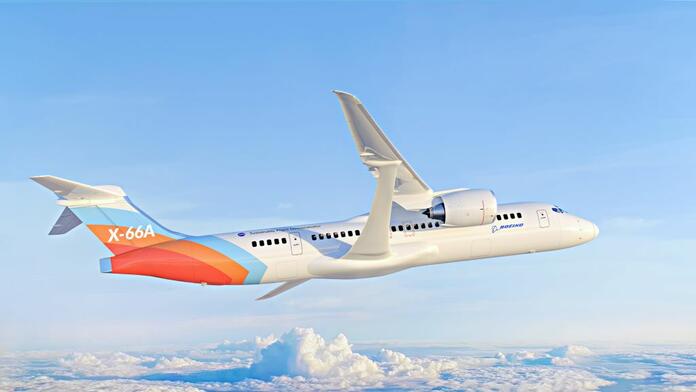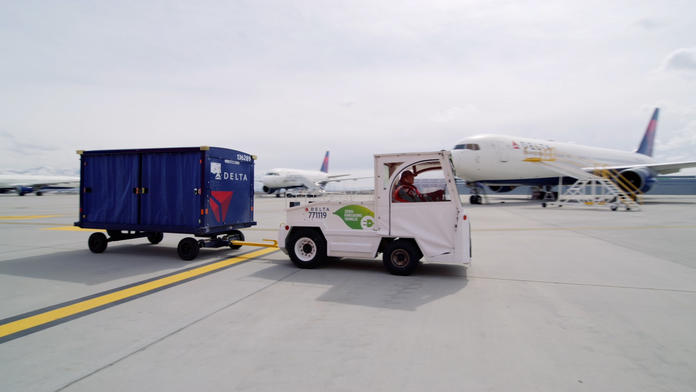10 ways Delta made progress toward a more sustainable future of flight in 2023
From welcoming back Amelia DeLuca to Delta’s Global Sustainability leadership team as CSO to continued initiatives to reduce emissions while spurring SAF production and reducing single-use-plastics on board, Delta continues to be a leader in sustainability in the aviation sector.

In 2023, Delta outlined its roadmap to a more sustainable future of travel that details the airline’s strategy for achieving net-zero emissions by 2050. The foundational goals of Delta’s sustainability strategy are organized under two pillars: embedding sustainability in everything the airline does and eliminating Delta’s climate impact from flying. As part of this roadmap, the airline made announced short-, medium- and long-term goals.
This year, the airline has undertaken numerous initiatives to help achieve those goals. From welcoming back Amelia DeLuca to the global sustainability team as Chief Sustainability Officer to being a founding member of a first-of-its kind coalition to scale sustainable aviation fuel (SAF), Delta has continued to set itself apart as a sustainability leader within aviation.
“Sustainability is a business imperative for Delta. Not only is it good for the planet and our communities, it’s also good for the business,” shared Amelia DeLuca, Delta Chief Sustainability Officer “While it may seem that sustainable can mean more expensive, reduced consumption – whether that’s in fuel savings, food and beverage, potable water, etc. – can help Delta save millions each year.”
Here are just some of the ways Delta has been working throughout the year to make progress toward its sustainability goals.
Delta Carbon Council Ushers in More Fuel Savings
Made up of leaders from across the airline, Delta’s Carbon Council drives fuel savings initiatives that align with the airline's strategic decarbonization goals. Teams across Delta have worked together to make an impact through fleet modifications, enhanced landing procedures, and optimizations to flight routing and speed. Their combined efforts delivered more than 20 million gallons in savings through 2023. Building on the 13 million gallons saved in 2022, cross-divisional efforts coordinated through Carbon Council saved an incremental 8 million gallons in 2023 through initiatives like:
- Enhanced routing with navigational database updates & South American User Preferred Routings.
- Reductions to catering service weight
- Reducing potable water on board, which leads to weight reduction, allowing the aircraft to fly lighter.
Continued Investment in Sustainable Aviation Fuel
With approximately 90% of Delta’s carbon emissions coming from jet fuel, finding lower emissions fuel alternatives is critical to making progress toward net zero. Enter SAF, the most promising lever known today to accelerate progress toward a net-zero future – it can use the existing fuel infrastructure to get it to airports and is safe to use in current aircraft engines. Delta Global Sustainability and Fuel teams have been working over the past several years to catalyze investment and stimulate SAF production by signing what’s known as offtake agreements with various SAF producers. These agreements ensure that Delta will purchase SAF from the producer when they have it, subject to certain conditions.
Delta continues to increase its annual use of SAF to build toward the airlines’ 2030 goals and help spur the SAF industry. In 2023 Delta expects to nearly double its use of SAF as compared to 2022.
Delta has also continued to advocate for policy incentives to scale the market so all airlines can access more sustainable, affordable fuels. For example, Delta is a founding member of Americans for Clean Aviation Fuels (ACAF), a diverse coalition of the largest industrial sectors in America from farmers to fuel producers and aviation to agribusiness focused on promoting the economic benefits of building a robust market for SAF and clean aviation fuels.
*Subject to third-party financing and timely facility development.
Sustainable Aviation Fuel
Founding Member of Minnesota SAF Hub
Delta was a founding member of a first-of-its kind coalition in Minnesota to scale SAF. The Minnesota SAF Hub is the first large-scale SAF hub in the U.S., reflecting unparalleled collaboration among key players across the value chain committed to scaling SAF production to replace conventional jet fuel. With not enough SAF produced to fuel the world’s commercial airlines for a single day, there is an urgent need for more SAF production.
Innovative Technology for Fleet
A key part of Delta’s sustainability strategy includes revolutionizing what and how the airline flies. Delta joined a sustainability coalition with Boeing and NASA to support the Sustainable Flight Demonstrator program. Delta will serve as an adviser on a new aircraft design with a Transonic Truss-Braced Wing, which will be the first ever X-Plane focused on sustainability; designated X-66, an airplane incorporating a similar configuration; and other expected improvements in propulsion, systems and materials which could lead to up to 30% reductions of fuel burn and emissions relative to current best-in-class single-aisle airplanes. Delta sold two retired MD-90s to Boeing to support this innovative project. These retired Delta aircraft will become the test planes for the program.
Another initiative that was made in coordination with the U.S. Air Force Research Lab and the FAA CLEEN III program includes repairing Delta’s 757 engine fan blades with an innovative, ceramic, leading-edge coating that reduces deterioration and preserves fuel efficiency. This fuel efficiency can be worth up to 1 million gallons of fuel savings a year.
Another key innovative technology improvement includes aircraft modifications and certification tests for a novel drag reduction system on the 737-800s with Aero Design Labs that kicked off late 2022; starting in 2024, Delta will begin testing a similar system on the 737-900ERs with Vortex Control Technologies.
Replacing Older Fleets with Fuel Efficient Next-Gen Aircraft
Delta continues to make its existing fleet more efficient as older aircraft retire. In 2022, Delta took delivery of 69 aircraft that were on average 25% more fuel efficient per seat mile than aircraft retired since 2019, contributing to a fleet-wide fuel efficiency improvement of 4.2% compared to 2019. Building off this, in 2023, Delta retired the CRJ-200, its least fuel-efficient aircraft type. The airline is on track to take delivery of 43 next-gen aircraft in 2023.
Spur collaboration and innovation with internal and external initiatives
Collaboration and innovation are core to Delta’s DNA, and as such, Delta participated in and hosted internal and external competitions to spur innovation and collaboration as it pertains to a sustainable future of flight.
In May, Delta participated in the second annual SkyTeam Alliance’s Sustainable Flight Challenge using its most fuel-efficient aircraft with two medium- to long-haul flights. Delta hosted the Sustainable Flight Challenge showcase at the Delta Flight Museum in October, and at the event, Delta was named a winner in two categories: “Lowest CO2 Ground Emissions Home Base” for electric ground support and “Best Innovation Wildcard” for several high-quality submissions.
As part of the Sustainable Flight Challenge, Delta began testing of a new paper cup, which as of December 2023 is in its final testing stage. Once fully rolled out, this new paper cup will eliminate approximately 7 million pounds of single-use-plastic*.
Additionally, internally, two of Delta’s Business Resource Groups came together to host a cross-business competition where teams would come together to innovate and collaborate to create and present a business initiative Delta could implement to operate a more sustainable flight across the Delta network. Teams came together to present ideas on how to optimize provisioning to reduce waste in-flight, activations for consumers and more.
*Compared to single-use-plastic on board in 2019.
Electrified ground support equipment across the system
Core ground support equipment (GSE) at Delta's hubs in Salt Lake City and Boston are nearly entirely powered with electricity, with airports in Seattle and New York City nearing the same status, a major step toward the airline's aspirational goal of having all Delta hubs with 100% GSE electrified by 2035. In 2023, Delta purchased more than 500 new electric GSE for utilization across Delta’s network, inclusive of baggage tractors, belt loaders, and aircraft tow tractors.
*Core fleet consists of baggage tractors, belt loaders and aircraft tow tractors.
Launched Aspirational Zero Waste Goal
In 2023 as part of Delta’s publicly released strategy, the airline aspires to divert 100% of waste from landfills by 2050 (65% waste diversion from landfill by 2035)*. To march towards this goal, Delta’s first ever Waste Council was established with leaders across the business. Within this council, test sites across the Delta operation have been evaluated to capture more recyclable materials by changing processes and leveraging catering kitchens. Additionally, multiple campus initiatives at the general office in Atlanta have contributed to eliminating waste, including transitioning to compostable materials in dining halls, centralized waste bin -design and more. This is all in addition to other initiatives within the operation to minimize single-use-plastic and promote landfill diversion, including the new paper cup testing initiative.
*As it relates to consumer onboard travel experience, excluding other aspects of aircraft operations.
Paperless Gates
In addition to Delta’s Waste Council, Delta made progress toward its paperless gates initiative. In 2023, gate agents stopped automatically printing pre-departure and departure documents on all flights. The process transformation included collaboration between Airport Customer Service, In-Flight Service and Flight Operations. The effort eliminates printer malfunctions that can cause delays; cuts paper and printer maintenance costs; and saves more than 70 million pages per year, the equivalent to 4,000 trees.
Joby – Delta’s eVTOL partner – makes first ever electric air taxi flight in New York City
Bringing Quiet, Electric Flight to New York City
Joby, Delta’s electric, vertical takeoff and landing (eVTOL) partner, successfully performed test flights in New York City, marking one of the first electric air taxi flights in the city and the first time Joby has flown in an urban setting. Joby and Delta first announced their first-of-its kind partnership to pioneer home-to-airport transportation to customers in October 2022. This electric air taxi flight was a critical demonstration of the adoption of electric air travel, and what’s possible in the future for a quiet, emissions-free flight. Both Joby and Delta are working toward making New York an early launch market after Joby receives certification from the Federal Aviation Administration.
2024 and Beyond
Sustainability touches nearly every role at Delta, and as such, we are committed to finding new ways to measure success and track progress toward our goals. As Delta continues to make progress on its sustainability journey, there will be new initiatives moving forward for all teams, including the operational teams, to be able to continue to make meaningful contributions to our decarbonization goals.
© 2025 Delta Air Lines, Inc.


